|
|
|
Sort Order |
|
|
|
Items / Page
|
|
|
|
|
|
|
| Srl | Item |
| 1 |
ID:
133568
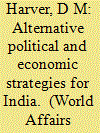

|
|
|
|
|
| Publication |
2014.
|
| Summary/Abstract |
D M Harver analyses the changing patterns of political ideology and economic thinking in India post-1985 and looks at the changing economic philosophy embraced by successive central and state governments. He also traces the main causes of the re-emergence of religiosity as a political factor.
|
|
|
|
|
|
|
|
|
|
|
|
|
|
|
|
| 2 |
ID:
130412
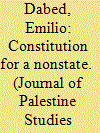

|
|
|
|
|
| Publication |
2014.
|
| Summary/Abstract |
This article sheds new light on the political history of legal-constitutional developments in Palestine in the fourteen years following the Oslo Accord. It examines the relationship between the unfolding social, political, and economic context in which they arose, on the one hand, and PA law-making and legal praxis, on the other. Focusing on the evolution of the Palestinian Basic Law and constitutional regime, the author argues that the "Palestinian constitutional process" was a major "battlefield" for the actors of the Palestinian-Israeli conflict. Thus, changes in the actors' political strategies at various junctures were mirrored in legal-constitutional forms, specifically in the political structure of the PA. In that sense, the constitutional order can be understood as a sort of "metaphoric representation" of Palestinian politics, reflecting, among other things, the colonial nature of the Palestinian context that the Oslo process only rearticulated. This perspective is also essential for understanding the evolution of the Palestinian-Israeli conflict after Oslo.
|
|
|
|
|
|
|
|
|
|
|
|
|
|
|
|
| 3 |
ID:
130809
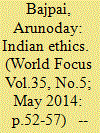

|
|
|
|
|
| Publication |
2014.
|
| Summary/Abstract |
The contemporary global community continues to be in throes of multiple problems accumulated in the course of growth and development of human civilization. The problems of violence within and among nations: rising terrorism and organized crimes in different parts of the globe; increasing poverty and hunger: threatening dimensions of food and energy crises and to cap it all pending catastrophe of climate change and other forms of environmental degradation. it is not that the global community- and nations collectively or individually are not aware of these challenges or they have failed to corrective actions. We are more aware of these problems than any time in the history of mankind. Also. we have put in place various strategies. policies and mechanisms to manage. and solve these challenges. Even global community has suddenly woken up to the call for switching over to the alternative vision of sustainable development. However. the alternative sustainable development strategy seems faltering amidst of unsustainable ideas and practices inspired by materialistic progress and over emphasis on sel?sh interests of nations and individuals alike. The moot question is how the prevailing development paradigms fashioned and refashioned to suits the needs of evolving globalized economy is capable of facing these challenges? What are its ethical foundations? What alternative ethical framework or vision we can evolve? And ?nally, how the Indian ethical framework is relevant for this alternative vision?
|
|
|
|
|
|
|
|
|
|
|
|
|
|
|
|
| 4 |
ID:
130413
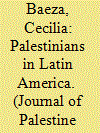

|
|
|
|
|
| Publication |
2014.
|
| Summary/Abstract |
Latin America is host to an estimated half-million people of Palestinian descent, the largest such population outside the Arab world. Migration to the region began in the late 1800s and peaked between 1900 and 1930, with surges around periods of war or economic crisis in Palestine. Predominantly the descendants of a pre-Nakba generation, mostly middle to upper-class Christians who are well-represented among political and business elites, Palestinians in Latin America do not easily fit into a national narrative shaped by the refugee experience. They have therefore held little interest for Palestinian historiography as they did not meet the criteria of "Palestinian-ness" as defined by a nationalist discourse centered on dispossession, denial, and statelessness. With a special focus on Chile,1 this article presents a historical overview of the Palestinian émigré community in Latin America, shedding light on its diverse and dynamic identity politics.
|
|
|
|
|
|
|
|
|
|
|
|
|
|
|
|
| 5 |
ID:
137952
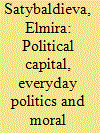

|
|
|
|
|
| Summary/Abstract |
Using the Bourdieusian framework to analyse the nature of social stratification in rural Kyrgyzstan, this article examines how local politics is strategised by different groups in the social field. The article suggests two modifications to the Bourdieusian framework to reflect better the nature of local politics. First, despite lacking significant capital holdings, poor groups undertake everyday resistance and mediated politics. Second, intellectual and traditional elites engage in the politics of ‘doing the right thing’, motivated by a sense of moral obligation. The article provides a critical challenge to the concept of clan and elite-led politics which is often used to explain events in Central Asia.
|
|
|
|
|
|
|
|
|
|
|
|
|
|
|
|
| 6 |
ID:
127817
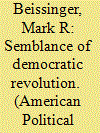

|
|
|
|
|
| Publication |
2013.
|
| Summary/Abstract |
Using two unusual surveys, this study analyzes participation in the 2004 Orange Revolution in Ukraine, comparing participants with revolution supporters, opponents, counter-revolutionaries, and the apathetic/inactive. As the analysis shows, most revolutionaries were weakly committed to the revolution's democratic master narrative, and the revolution's spectacular mobilizational success was largely due to its mobilization of cultural cleavages and symbolic capital to construct a negative coalition across diverse policy groupings. A contrast is drawn between urban civic revolutions like the Orange Revolution and protracted peasant revolutions. The strategies associated with these revolutionary models affect the roles of revolutionary organization and selective incentives and the character of revolutionary coalitions. As the comparison suggests, postrevolutionary instability may be built into urban civic revolutions due to their reliance on a rapidly convened negative coalition of hundreds of thousands, distinguished by fractured elites, lack of consensus over fundamental policy issues, and weak commitment to democratic ends.
|
|
|
|
|
|
|
|
|
|
|
|
|
|
|
|
|
|
|
|
|